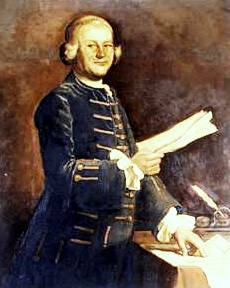A Critical Review in The Critical Review
In 1764 James Otis, Jr., published The Rights of the British Colonies Asserted and Proved, which based the campaign against Parliament’s new colonial revenue laws on the ideas of natural rights and (though this term wouldn’t be formulated for another four years) “no taxation without representation.”
The Critical Review was a British political magazine founded in 1756. It was firmly conservative or Tory. The founding editor was the doctor and writer Tobias Smollett, but he left in 1763 and I’m not sure who helmed the magazine the following year.
In November 1764 The Critical Review ran a critique of Otis’s argument. Typical for the magazine, much of the space devoted to that book consisted of long extracts from it. At the end the reviewer wrote:
The Critical Review was a British political magazine founded in 1756. It was firmly conservative or Tory. The founding editor was the doctor and writer Tobias Smollett, but he left in 1763 and I’m not sure who helmed the magazine the following year.
In November 1764 The Critical Review ran a critique of Otis’s argument. Typical for the magazine, much of the space devoted to that book consisted of long extracts from it. At the end the reviewer wrote:
The author then…affirms, that government is founded on the necessity of our nature; and that the supreme absolute power existing in, and presiding over, every society, is originally and ultimately in the people, who cannot freely nor rightfully renounce that divine right. These are maxims far from being new; but as the author endeavours to prove that ancestry cannot renounce the rights of posterity, we wish he had thrown in an argument to demonstrate, by a parity of reasoning, that posterity ought to renounce all benefits from ancestry.I don’t find “Our system is unfair to lots of people, not just you” to be a convincing argument not to change. The reviewer rests his dismissal mostly on the idea that the North American colonists had inherited a great many advantages from the British system, political and economic, and should be grateful rather than seeking equality based on philosophical principles.
Perhaps our reader may be curious to know the definition Mr. Otis gives of a plantation, or colony; which, he says, ‘is a settlement of subjects in a territory disjoined or remote from the mother country, and may be made by private adventurers, or the public; but in both cases the colonists are entitled to as ample rights, liberties, and priviledges, as the subjects of the mother country are, and, in some respects, to more.’
We are next entertained with a dissertation on the natural rights of colonists, where the author gives us some quotations from Grotius, Puffendorff, Domat, Strahan, and others; who, it is plain, knew nothing of the British constitution, or of the relation which our colonies have with the mother country. The sum total of what our author contends for, seems to be that our ‘northern colonies, who are without one representative in the house of commons, should not be taxed by the British parliament.' Good Mr. Otis, give Great-Britain fair play, and do not put into the heads of Leeds, Hallifax, Birmingham, Sheffield, that part of the duchy of Lancaster which lies at the very gates of the Royal Palace, and many other places of great opulence, that they are not bound to pay any taxes imposed by a British parliament, because they have no representative in that body.
We applaud Mr. Otis’s zeal, and should, be glad that he had published a scheme of reciprocal independence between our colonies and Great Britain, which may be done in the way of debtor and creditor, and which very possibly might awaken him and his vigorous friends from their visionary dreams of independency upon their mother country. There is nothing like fair counter-reckoning, good Mr. Otis.


